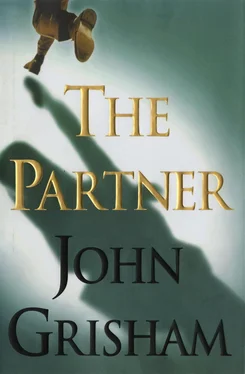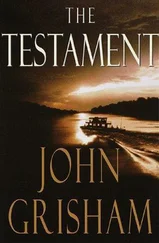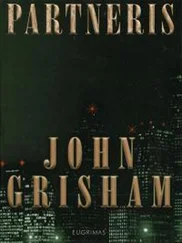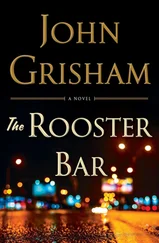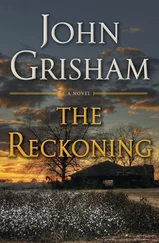“Just after dark, I was sitting on Clovis’ front porch when the hearse pulled up. I helped Rolland roll the casket down the driveway. We manhandled it up the steps, over the porch, and into the den, where we parked it in front of the television. I remember thinking how light it was. Clovis had shriveled up to a hundred pounds.
“‘You the only one here?’ Rolland said, looking around.
“‘Yep. It’s a small wake,’ I said.
“I asked him to open the casket. He hesitated, and I told him that I had forgotten to include some Civil War memorabilia that Clovis wanted to be buried with. While I watched, he opened the casket with his church key, a small generic wrench which will open any casket in the world. Clovis looked the same. On his waist, I placed his grandfather’s infantryman’s cap and a tattered regimental banner from the Seventeenth Mississippi. Rolland closed the casket again, and left.
“No one showed up for the wake. Not a soul. I turned the lights off around midnight and locked the doors. Church keys are nothing more than Allen wrenches, and I had purchased a full set. It took less than a minute to open the casket. I removed Clovis; he was light, stiff as a board, and shoeless. I guess for three thousand bucks you don’t get a pair of shoes. I laid him gently on the sofa, then I placed four concrete cinder blocks in the coffin, and closed it.
“Clovis and I left and drove to my hunting cabin. He was lying in the backseat, and I was driving very carefully. It would’ve been difficult to answer questions from a highway patrolman.
“A month earlier, I had bought an old freezer and put it on the screened porch of the cabin. I had just managed to get Clovis stuffed in the freezer when I heard something in the woods. It was Pepper, sneaking up on the cabin. Two o’clock in the morning, and Pepper caught me. I told him my wife and I had just finished a big fight, I was in a foul mood, and would he please leave. I don’t think he saw me wrestling the corpse up the steps of the cabin. I locked the freezer with log chains, put a tarp over it, then some old boxes. I waited until dawn because Pepper was out there somewhere. Then I sneaked off, drove home, changed clothes, and was back at Clovis’ by ten. Rolland arrived in a chirpy mood and wanted to know how the wake went. Just perfect, I said. The grieving had been held to a minimum. We pushed and pulled and loaded the casket back into the hearse, then went to the cemetery.”
Karl listened with his eyes closed, his lips curled into a smile, his head shaking slowly in disbelief. “You devious bastard,” he said, almost to himself.
“Thanks. On Friday afternoon, I went to the cabin for the weekend. I worked on a brief, scouted turkeys with Pepper, checked on old Clovis, who seemed to be resting comfortably. Sunday morning, I left before sunrise and positioned the dirt bike and the gasoline. Later, I drove Pepper to the bus station in Jackson. After dark, I removed Clovis from the freezer, sat him up next to the fireplace so he’d thaw, then around ten put him in my trunk. An hour later, I was dead.”
“No remorse?”
“Of course. It was a terrible thing to do. But I made the decision to vanish, Karl, and I had to figure out a way. I couldn’t kill anybody, but I needed a body. It actually makes sense.”
“Perfectly logical.”
“And when Clovis died, it was time for me to leave. A lot of it was luck. So many things could’ve gone wrong.”
“Your luck continues.”
“So far.”
Karl looked at his watch, and took another crab claw. “How much of this do I tell Judge Trussel?”
“Everything but Clovis’ name. We’ll save that for later.”
Patrick sat at the end of the table. His space was clear, unlike his attorney to the right, who had two files and a short stack of legal pads arranged like weapons poised for battle. To his left sat T.L. Parrish, with only one legal pad but also armed with a bulky tape recorder, which Patrick had allowed him to set up. No associates or flunkies to complicate things, but since all good lawyers need verifiers, they agreed to the taping.
Now that the federal charges had disintegrated, the pressure was on the state to extract justice from Patrick. Parrish felt it. The feds had dumped this defendant on him so they could chase a Senator; off to bigger things. But this defendant had new twists to add to the story, and Parrish was at his mercy.
“You can forget capital murder, Terry,” Patrick said. Though nearly everyone called him Terry, it grated a bit coming from a defendant he’d barely known years before in a prior life. “I didn’t kill anyone.
“Who burned in the car?”
“A person who had been dead for four days.”
“Anybody we know?”
“No. It was an old person nobody knew.”
“How did this old person die?”
“Old age.”
“Where did this old person die of old age?”
“Here, in Mississippi.”
Parrish drew lines and made squares on his pad. The door had opened when the feds collapsed. Patrick was walking through it; no shackles, no handcuffs, nothing, it seemed, could stop him.
“So you burned a corpse?”
“That’s correct.”
“Don’t we have a statute on that?”
Sandy slid a sheet of paper across the table. Parrish read it quickly and said, “Forgive me. It’s not something we prosecute every day.”
“It’s all you have, Terry,” Patrick said, with all the cool confidence of someone who’d planned this meeting for years.
T.L. was convinced, but no prosecutor folded this easily. “Looks like a year in jail,” he said. “A year in Parchman should do you good.”
“Sure, except that I’m not going to Parchman.”
“Where do you plan to go?”
“Somewhere. And I’ll get there with a first-class ticket.”
“Not so fast. We have this body.”
“No, Terry. You don’t have a body. You have no clue who got cremated, and I’m not telling until we cut the deal.”
“The deal being?”
“Drop the charges. Give it up. Both sides pack up and go home.”
“Oh, that’ll look nice. We catch the bank robber, he gives the money back, we drop the charges, and wave good-bye to him. That’ll send the right message to the other four hundred defendants I have under indictment. I’m sure their lawyers will understand. A real shot in the arm for law and order.”
“I don’t care about the other four hundred, and they certainly don’t care about me. This is the criminal process, Terry. It’s every man for himself.”
“But not everybody is on the front page.”
“Oh, I see. You’re worried about the press. When is reelection. Next year?”
“I’m unopposed. I’m not too worried about the press.”
“Of course you are. You’re a public official. It’s your job to be worried about the press, which is precisely the reason why you should dismiss the charges against me. You can’t win. You’re worried about the front page? Imagine your picture there after you lose.”
“The family of the victim does not wish to press charges,” Sandy said. “And the family is willing to go public.” He lifted a piece of paper and waved it. The message was delivered: we have the proof, we have the family, we know who they are and you don’t.
“That’ll look good on the front page,” Patrick said. “The family begging you not to prosecute.”
How much did you pay them, he started to ask, then let it go. It was not relevant. More doodling on the legal pad. More appraising his sinking options as the tape recorder captured the silence.
With his opponent on the ropes, Patrick moved in for the knockout. “Look, Terry,” he said sincerely. “You can’t prosecute me for murder. That’s gone. You can’t prosecute me for mutilating a corpse, because you don’t know who got mutilated. You have nothing. I know it’s a bitter pill to swallow, but you can’t change the facts. You’ll take some heat, but, hell, that’s part of your job.”
Читать дальше
